- Home
- Raymond Benson
The Secrets on Chicory Lane Page 3
The Secrets on Chicory Lane Read online
Page 3
At some time or another during those early years, we all played with one another in the park, which was the real center of our universe. The elementary school was next to the park, so everyone walked to classes every single day. That was a time when kids could be outside and safe, or so we thought. Those were the days of lunch pails, Halloween carnivals and trick-or-treating, The Dick Van Dyke Show, and catching horny toads, the indigenous lizards that populated the area—technically called “horned” toads, though kids always called them horny toads. Since Chicory Lane was a fairly new development right on the edge of town, we could walk two or three blocks beyond the park and be in vacant lots. The desert. It was not uncommon to see all kinds of lizards and snakes and bugs around our little world decorated with mesquite and tumbleweeds. West Texas winds are notorious—they rival Chicago’s!—and the dust storms are atrocious. But there’s something dreamy about the sight of a tumbleweed being carried along the ground in a wide, open space. I suppose my favorite thing about growing up in Limite was the view of a hundred-and-eighty-degree sunset, horizon to horizon. Some nights, it was breathtakingly gorgeous. The vastness of the stars—and omniscient moon—was magnificent.
Today all those vacant lots are developed, and the city extends for miles. Things change.
My dad worked in a bank. By the time I was in high school, he was the manager of the Fifth National Bank, holding that title until he retired. My mother was mostly a stay-at-home mom, although she took some part-time jobs as a temp secretary when I was in grade school. She was a good typist and worked on a manual machine—which is what I learned to type on. I became a competent typist, too. Good genes. Unfortunately, my mother had some serious problems and never held a job for very long. My parents, Craig and Shirley Truman.
I was the only child until my baby brother, Michael Craig Truman, was born on April 20, 1966. I was eleven years old and in sixth grade. Mom and I never spoke about why they had another child when there was such an age difference between the siblings, but I do recall Mom calling him her “little miracle.” She was thirty-seven when he was born.
A month later that year, I turned twelve. The pictures of me at the time show a girl with straight, dirty-blonde hair and bangs. Blue eyes. I was of average height and weight, and I was already growing breasts. I think I started wearing a bra about the time I turned eleven. My funny-looking stage didn’t last very long, thank goodness. Girls always go through a funny-looking stage—acne, weirdly proportioned limbs, awkwardly budding breasts—and afterwards they bloom.
At that frozen moment of time in May, we were a typical family; we were happy. My dad made a modest middle-class salary, and we were the epitome of baby boomer living. We went to church every Sunday. Every Sunday. The First Christian Church was Protestant and proud of it. I got the impression the adults there thought they were above the Baptists or Methodists. To me there was no difference. I grew up believing in God—and I suppose I still do. After all, if Evil exists, then there damn well better be some Good somewhere, right?
The Lord knows my faith has been tested over the years. The first time was when I was twelve, that summer of 1966.
My interests then were puppets, bike riding, piano playing, and storytelling. I loved to put on puppet shows. One of my most cherished toys was an elaborate puppet theater that my father built for me. I suppose that’s where my talent for writing comes from; I was always making up tales. Once I got Eddie to help me carry the theater all the way to the park, where he and I put on a puppet show for anyone who wanted to watch. We drew a crowd of twenty people, which was huge to me at the time. Eddie could sketch and paint, so he made the scenery. Eddie was often my collaborator. Sally was my best girlfriend, but Eddie was my best friend. We spent a lot of time together because we were just about the same age—Eddie was just a year behind me in fifth grade. We were both eleven when Michael was born. Sometimes the kids on the block made fun of us and called us “boyfriend and girlfriend,” which was embarrassing. I’m pretty sure Eddie enjoyed that misrepresentation, but I didn’t. In my mind, we were more like brother and sister.
My mom didn’t particularly like me spending so much time with Eddie. For one thing, he was a boy, and secondly, she thought his parents, Charles and Betty Newcott, were strange. His mother was nice enough, but she was sickly, and I don’t think I ever saw her not wearing a ratty bathrobe and smoking a cigarette. It was Mr. Newcott who scared me. All the kids were afraid of him. A big, tough guy, he worked in the oil fields. We thought he was mean, especially to Eddie, his only child. Eddie and his mother were completely subservient to the man.
Mr. Newcott was forever threatening to “get the belt” after Eddie. Nothing Eddie did was good enough for his father. It seemed to me that Eddie was always being punished for something, usually stupid stuff. In the backyard of Eddie’s home, Mr. Newcott had built a bomb shelter as big as a large single room. Families in the early sixties had built these shelters because of the so-called Red Scare. By 1966, though, no one believed a nuclear attack on American soil would happen, and the folks who had spent a bunch of money to build the shelters felt foolish. The shelter in Eddie’s backyard was abandoned, and it became our secret play place, our own little safe haven—but Mr. Newcott didn’t like us playing in the shelter. If he caught us in there or even looking like we might be thinking of going in there, he’d send me home and give Eddie a beating—I recall several occurrences.
Luckily, Mr. Newcott was usually gone during the days—sometimes several days at a time. That’s when we felt the safest, and we would sneak into the bomb shelter, pretending we were living in an isolated encampment in a fantasy universe of our imaginations. When the bomb shelter wasn’t possible, Eddie and I met at the park, where we could also be by ourselves away from the prying eyes of the grown-ups. Every once in a while, Eddie would also come across the street to my house where we’d play board games in the living room or watch TV together. Rarely would he step foot in my bedroom. Mom didn’t think that was appropriate. And usually either she or both my parents were home when he came over.
Five houses down from mine, another interesting character lived on Chicory Lane, one who turned out to be a significant part of the story that summer. Gordon Alpine—I still think of him as simply “Mr. Alpine”—was a divorced man in his late thirties who worked at the public library, was a photographer who specialized in kids’ school portraits and baby pictures, and served on the school board for one of the junior highs. Gordon Alpine also happened to be the brother of Carl Alpine, the mayor of Limite.
Mr. Alpine owned an 8 mm movie projector, and he often invited the neighborhood kids into his house to watch a bunch of cartoons and old comedy films or look through his collection of vintage toys and comic books. Mr. Alpine was always happy to show off his collection, provide a glass of lemonade or Kool-Aid and cookies, and let us play with some of his less valuable toys. Or show Charlie Chaplin or Three Stooges shorts. Mr. Alpine was a nice man. He’d always come outside and say hello whenever a group of kids was in front of his house; sometimes he’d have a handful of comic books and give them away. He was also a highlight of going to the library—he was always entertaining and funny, as well as helpful. He acted as if he wanted to be a kid again.
It turned out he had everyone fooled. We didn’t know it, but Evil had paid a visit to Mr. Alpine, too. He turned out to be more frightening than Eddie’s dad.
He was a monster.
4
Dashes of memories. Brief snippets of a film strip, edited and jumbled.
What happened in the months prior to the summer of 1966? In the beginning, everything seemed normal. Our family had a new member. Michael was almost two months old when school let out at the end of May. He had the loudest cry. He was a colicky baby, keeping everyone in the house up at night. Then, when you’d think he was all tuckered out and would sleep all day, he’d cry during the day, too. It was worse than nails on a blackboard, and it drove us insane.
Nevertheless, like all kids
feel when school lets out, I looked forward to the whole summer in front of me. Seventh grade and junior high school seemed far in the future. When you’re that young, time stretches—a three-month summer could last an eternity.
The business with Eddie and me had begun a few months earlier while I was still eleven. Before, we acknowledged each other on the street and in school, getting together with other kids for our usual outdoor play. We only started getting closer in early 1966, when my mother was pregnant. More and more, our afternoons and evenings were spent together without the other kids present. I can’t recall why or how it happened; somehow Eddie and I clicked for the first time.
One thing still vivid in my mind was my young perception that Eddie Newcott was the most beautiful boy I knew. Even at ten years old (and later when he turned eleven in February that year), he was handsome like a man was handsome. Other girls at school also commented on how cute Eddie was, though they also thought he was “weird.” Yes, he was a little strange. Quiet and introverted, he read comic books all the time and didn’t have many friends of his own. He drew bizarre pictures in a sketchbook; you’d think he was working for a Halloween store or something, with all the scary images he created—skeletons, devils peeking out of flames, monsters, dinosaurs, and witches. Some of his more elaborate work consisted of army battlefields complete with soldiers and tanks. Eddie spared no restraint in depicting dismemberments, decapitations, and bodies riddled with bullet holes. There was a lot of red. All this would have been reason enough to discard Eddie as being truly strange, except that the drawings were good. He had talent. Supposedly his teacher admonished him for the subject matter of his artwork but praised his ability and encouraged him to try something else. I’m not sure if he ever did.
Eddie had very distinctive, dark, bushy eyebrows. His eyes were a deep brown and his hair was almost black, though it would turn even darker later with age. His father made him wear his hair in a buzz cut at that time, and he grew it out when he was older. He was thin and very tall for his age, with full, cushiony lips. Yes, Eddie was a good-looking boy.
I realized just how attractive he was when we walked home from school together one afternoon. Two older girls in junior high passed us, turned back, and said, “Hello, Eddie!”
“Hi,” he said.
I heard them giggling as they walked on and turned to see them glance back a couple of times. What was the big deal? I thought. “Do you know them?” I asked.
He shrugged. “I guess.”
Eddie and I continued walking, but I looked at him with a renewed respect.
“What?” he asked, catching me in the act.
“Nothing.”
“You’re looking at me funny.”
“Those girls must think you’re cute or something.”
He blushed and turned away, grinning. Suddenly, I felt good about walking home with Eddie.
I didn’t care that I was a year older. If other girls thought he was cute, then maybe I did, too. I’d never had a boyfriend. I didn’t know much about sex at all. After all, I had just turned twelve in May. Kids these days learn about the birds and the bees at very young ages, but back in the mid-sixties, that certainly wasn’t the case. I’d already gotten my period, so I understood all of that, but as far as I knew, sex was a mysterious thing that married grown-ups did to have babies. I wasn’t too clear on the mechanics. Back in sixth grade, all the girls were taken out of class for an assembly to watch a film about periods and how our bodies would be changing in the next few years. Some of us were already doing so! However, the movie was vague on the aspects of reproduction. That didn’t stop the girls from talking and trading stories and myths about boys—just as the boys did about us. We weren’t stupid. Nevertheless, I was old enough to know what infatuation felt like—a lovely lump of feeling in the middle of the chest. The very feeling that began to grow that day as I walked back home with Eddie on the sidewalk.
From February through June of 1966, Eddie and I were inseparable. I strain to recall, unsuccessfully, a complete sequence of events. A few concrete memories, likely not in the proper order, that stand out in my mind.
I remember Eddie’s cat. A pretty black cat that was free to roam both inside and outside the Newcott home. It had a boy’s name, something like “Jimmy” or “Johnny.” Yes, I believe it was Jimmy. My dad once commented that Jimmy would get run over one day because it tended to dart across the street at night when it was out on the prowl for unsuspecting prey, usually in our favorite park.
There were also the times we spent in the park, lazing away many afternoons while school was still on. I remember one of those days. Eddie, some of the other boys from the block, including Greg and Dean, and I were hanging out on the monkey bars. I watched as Greg and Dean, who always wore identical sports jerseys, swung back and forth. They might as well have been Tweedledum and Tweedledee. Not missing his chance to show off, Eddie mentioned that Mr. Alpine had just given him a couple of Spider-Man comic books, which he considered a tremendous score.
Greg stopped swinging. “Mr. Alpine is creepy,” he said, adding that he refused to go by the man’s house.
“Yeah,” Dean concurred. Dean always agreed with Greg. Turning to look me right in the eyes, he said, “You better watch out; he’s a boogey-man.”
I didn’t know what they were talking about. “No, he’s not,” I said. “He takes our school pictures.” It was true—one of Mr. Alpine’s jobs, aside from working at the library, was to take the portraits of the kids at school. In fact, he had recently shot an adorable photo of baby Michael. “Mr. Alpine’s always been nice to me.”
The two older boys laughed. “Sure, he’s nice to you. I bet he’s nicer to Eddie, though.” Snicker, chuckle.
Eddie blushed and furrowed his brow. “What do you mean?”
“If you don’t know, then never mind,” Greg answered.
Then Dean said, “Don’t you know he killed his kid?”
“What?”
“Yeah, about ten years ago. He was married and had a kid, a little boy. He lived somewhere else then.”
I looked at Eddie. “Is that true?”
Eddie shook his head. “I never heard that.”
Greg continued. “Yeah. Mr. Alpine’s wife told the police that he killed the baby and divorced him.”
“Did he go to jail?” I asked.
“Nah. He wasn’t even arrested. The cops didn’t believe her. You know who his brother is?”
I did know. “Mayor Alpine,” I said. The mayor of Limite.
When the twins had left, I asked Eddie, “Is that true about Mr. Alpine?”
“What?”
“About his wife, his kid, and all that.”
“Are you kidding? I think I knew he was married before, but I never heard that he killed his own kid. Don’t pay attention to them. They’re just bullies. I don’t know what they’re talking about. C’mon. Let’s go in the airplane.”
“Okay.”
We wandered over to the wrecked fuselage and climbed the ladder to the cockpit. From there, we descended into the hull of the plane and sat on the dirty metal floor. I looked at my watch—my treasured Mickey Mouse wristwatch that I got for my previous birthday—and noted the time.
“I’ll have to get home for dinner soon,” I said. “Mom doesn’t like it if she has to go outside and call for me.”
“I know. My mom and I will probably end up going to the cafeteria again. She doesn’t cook much except when my dad is home.”
“Is he gone again?”
“He’s working in the field. You want to come over after dinner? We can go down to the bomb shelter if you want.”
The idea of being alone with Eddie in his backyard sanctuary shook up the butterflies in my stomach. “Better not,” I said. “We might get in trouble.”
“My mom doesn’t care. She won’t even know. She doesn’t pay any attention to me or what I’m doing. And Dad’s not home.”
I changed the subject. “Are y’all going anywhere on va
cation?”
Eddie looked at me as if I was nuts. “Vacation? The last vacation we went on was to see my grandparents in Arkansas. That was three years ago. I was eight. All I remember was the long, hot drive in the car, and then I was bored to death for a week. Horrible.”
“I don’t guess we’re going anywhere this year, since there’s a new baby in the house.”
“Hey, I saw at the movie theater that they’re bringing back Help! You want to go see it?”
“I saw it last year.” Eddie was into the Beatles. I liked them all right, but he thought they were the second coming.
“I want to see that James Bond double feature that’s coming, too,” he said. “Maybe your parents will drive us if you want to go with me.”
“I don’t know if they’ll let me see those movies. Aren’t they for grown-ups?”
“Nah. I saw Thunderball, and it was great.”
That was one thing Eddie did a lot of—see movies. If he didn’t have anyone to go with, Eddie’s mother would drive him downtown to one of the theaters on a Saturday and he’d spend all day repeatedly watching whatever was playing. Sometimes I think he just didn’t want to be home on the days I wasn’t available. He liked playing records, too. Not only did he have all of the Beatles’ albums, but he also listened to early rock groups like the Rolling Stones, Herman’s Hermits, the Beach Boys, and so on. Sometimes that’s what we did together when we were at my house or his. He’d bring over a stack of 45s, and we’d play them.
Out of the corner of my eye, I noticed human figures in the window of the cockpit. Two boys from school—I don’t remember their names now—were spying on us. “Hey, look, it’s the lovebirds,” one of them said. “What are y’all doing hiding in the airplane? Huh?”
“Shut up,” Eddie said. “We’re just talking.”
The other one sang, “Eddie likes Shelby, Eddie likes Shelby, Shelby likes Eddie, Shelby likes Eddie …”
“Shut up!” Eddie repeated, standing up, ready to punch one of them in the face. They ran off laughing. That was my cue to get home, so I stood up, too.

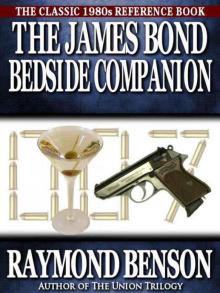 The James Bond Bedside Companion
The James Bond Bedside Companion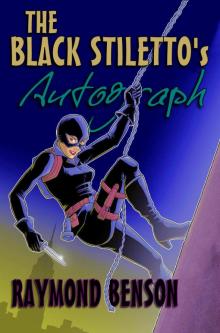 The Black Stiletto's Autograph
The Black Stiletto's Autograph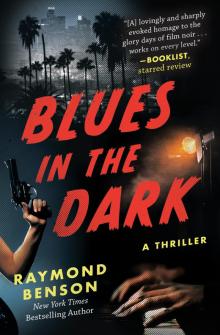 Blues in the Dark
Blues in the Dark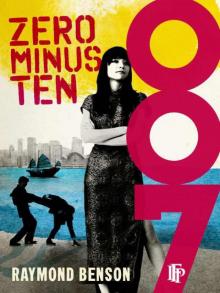 Zero Minus Ten
Zero Minus Ten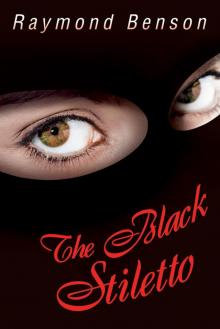 The Black Stiletto
The Black Stiletto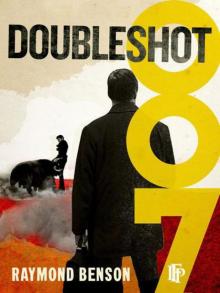 Doubleshot
Doubleshot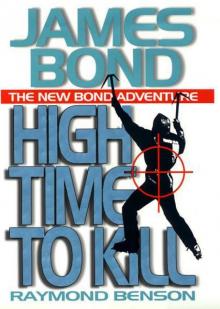 High Time To Kill rbb-3
High Time To Kill rbb-3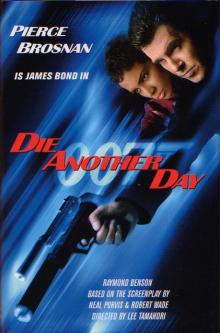 Bond Movies 07 - Die Another Day
Bond Movies 07 - Die Another Day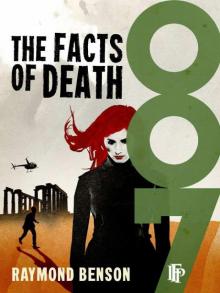 The Facts Of Death
The Facts Of Death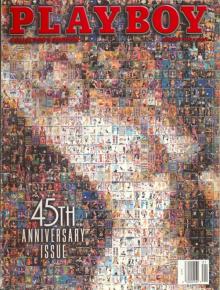 Midsummer Night's Doom
Midsummer Night's Doom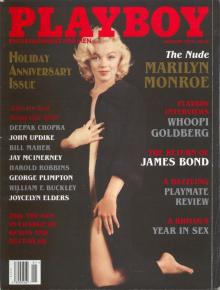 Blast from the Past
Blast from the Past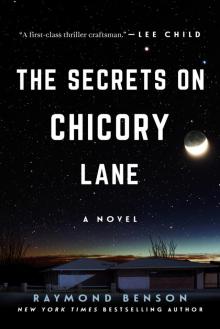 The Secrets on Chicory Lane
The Secrets on Chicory Lane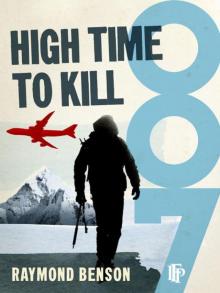 High Time To Kill
High Time To Kill The Black Stiletto: Black & White
The Black Stiletto: Black & White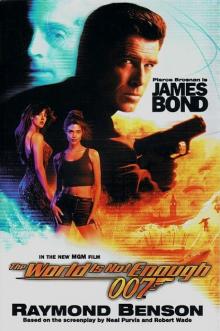 The World Is Not Enough jb-1
The World Is Not Enough jb-1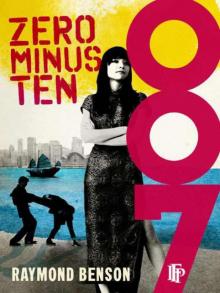 Zero Minus Ten rbb-1
Zero Minus Ten rbb-1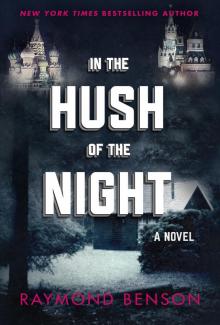 In the Hush of the Night
In the Hush of the Night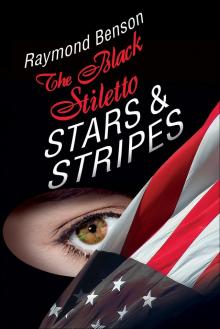 The Black Stiletto: Stars & Stripes
The Black Stiletto: Stars & Stripes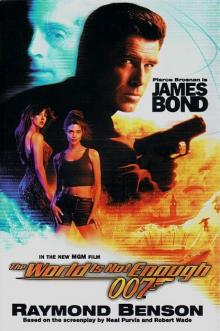 Bond Movies 06 - The World Is Not Enough
Bond Movies 06 - The World Is Not Enough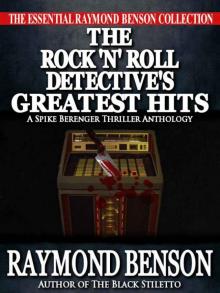 The Rock 'n Roll Detective's Greatest Hits - A Spike Berenger Anthology
The Rock 'n Roll Detective's Greatest Hits - A Spike Berenger Anthology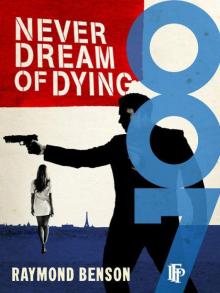 Never Dream Of Dying
Never Dream Of Dying